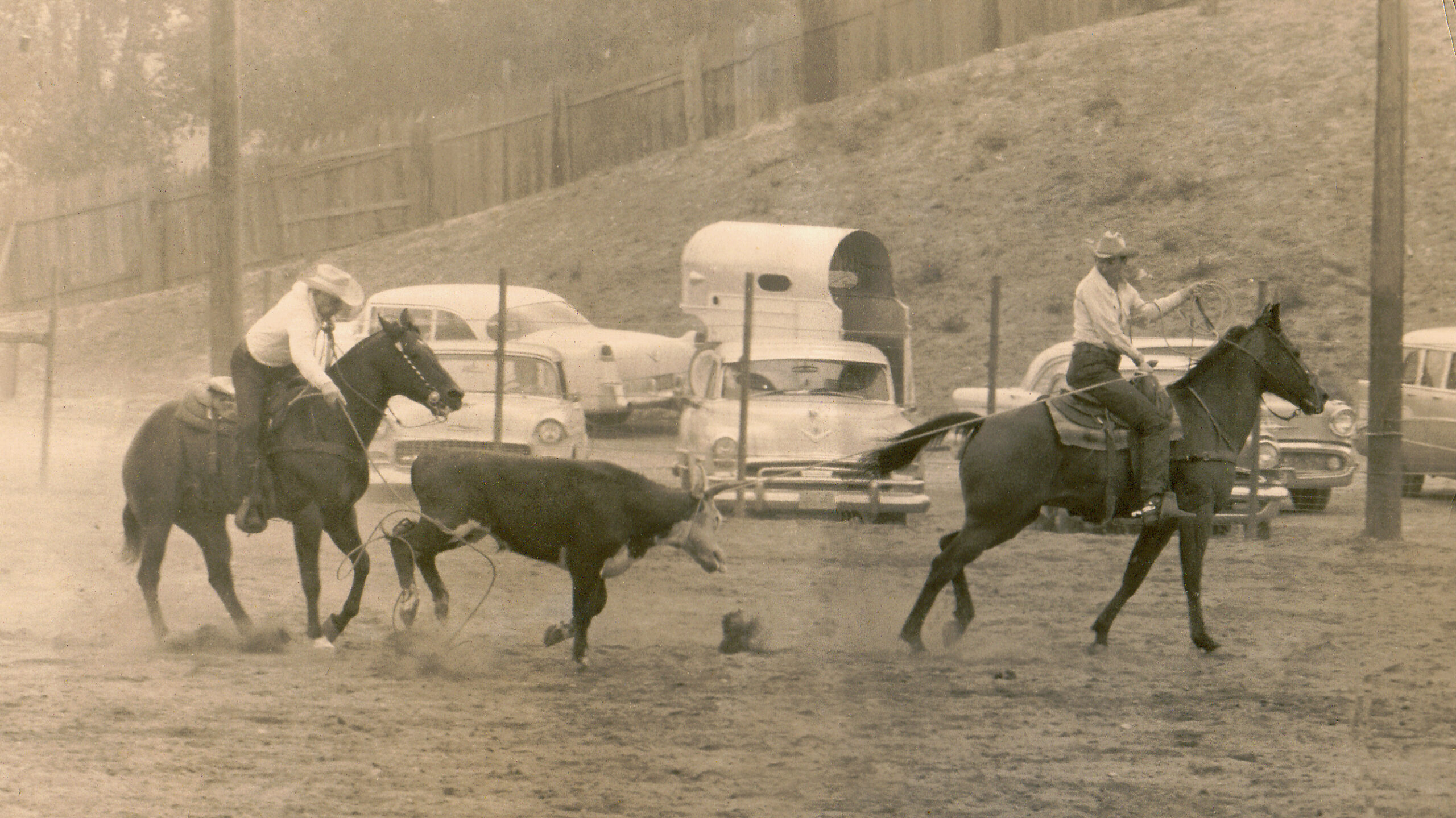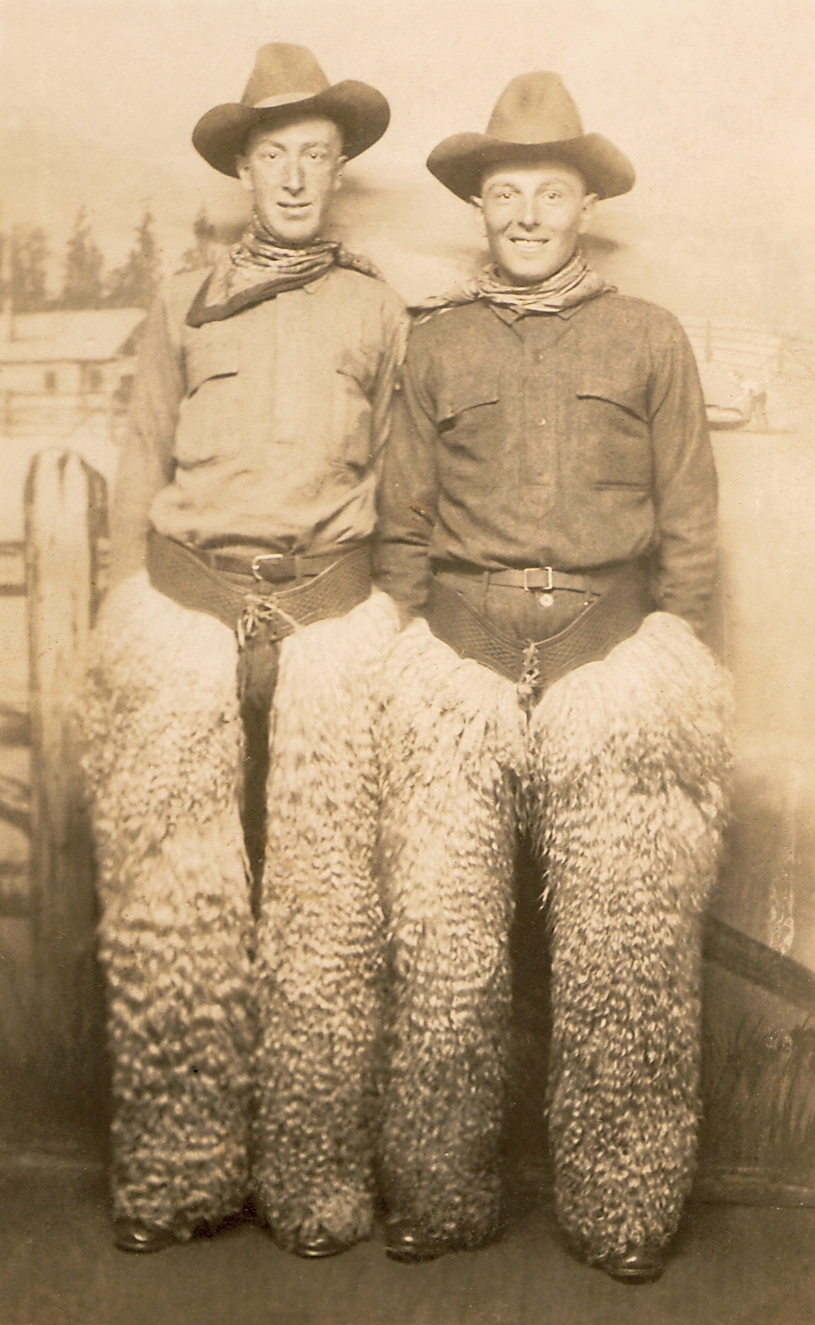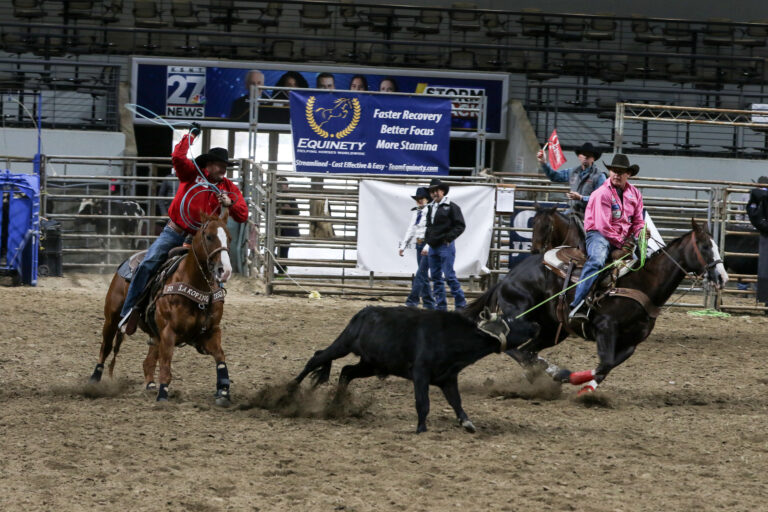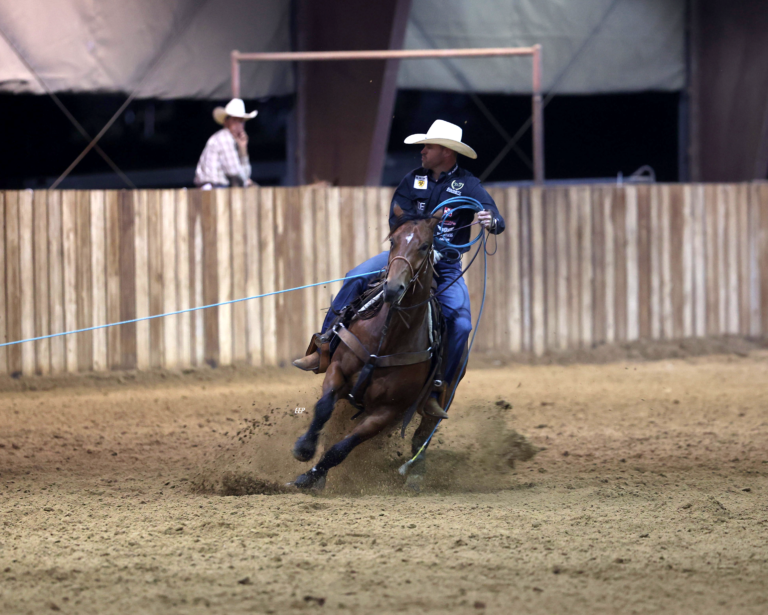From the 2005 Spin To Win Rodeo archives, a look back at a team roping legend.

The Professional Rodeo Cowboys Association has boomed to more than 9,000 contestant members who, each year, compete at nearly 700 rodeos nationwide and in Canada. The cowboy sport is Americana at its finest, and the love of this game is a cherished tradition handed down from one generation to the next.
Today we talk of Jake and Clay, and Speed and Rich. They’re flat amazing and have helped take the team roping event to previously unimaginable new heights. As awesome as they are, it’s important for us all to turn back the pages of rodeo’s history books from time to time to remember where we came from.
I’m here to tell you about the guy who carried original Rodeo Cowboys Association Card No. 562 in his back pocket. Without strong influence from the likes of Charlie Maggini, who’ll be inducted into the ProRodeo Hall of Fame in Colorado Springs on July 16, the sport’s evolutionary path would have been different. We’ll never know exactly how things might be different today had he not spent nearly 90 years on this planet, but we do know for certain that it wouldn’t be the same had guys like him not made their mark on the Western industry.
Charlie Maggini was born August 9, 1894, in San Benito, California, and died April 9, 1982. I’ve heard my dad and his friends talk about him. They respectfully reminisce of a masterful horseman, a roper extraordinaire who was second to none in the branding corral, and a fun-loving character who loved to tell a good story in his golden years but needed not exaggerate the wild details of how things really went down decades earlier. The truth was edgier than anything he could have concocted for the sake of a riveting story.
Before the PRCA predecessor Cowboys’ Turtle Association was even formed in 1936, Charlie Maggini won world titles in the team roping and steer roping events in 1929. That was the first year professional world titles were recognized in rodeo, so Maggini was the first cowboy ever to win world championships in more than one event the same year. Earl Thode was that year’s all-around and saddle bronc riding champ.
I stumbled across some fascinating facts in my research for this story, several basically by accident. The PRCA dug up a two-page, hand-written note out of the archives which was penned personally by Maggini and dated Nov. 1, 1957. In it, he tells of time spent in his youth working at the world-famous Miller and Lux Ranch, which at that time had operations in California, Oregon, Nevada, Utah and Idaho.
Maggini started working for Miller and Lux in 1915, when he was 21, and worked in Oregon, Nevada and Utah before returning to California to serve as cattle superintendent over Miller and Lux’s Los Baños Outfit in the San Joaquin Valley.
“We ran 36,000 head of cattle,” Maggini wrote. “We branded around 8,000 head of calves each year, and we roped them, so we had plenty of practice.”
Maggini stuck with Miller and Lux until 1928, when they started to sell off their ranching interests. He then served 18 months as a Quarter Master Sgt. for the Remount Service during World War I. Maggini was in charge of training horses for the U.S. Cavalry unit at Camp Lewis, Washington.
The hand-inked letter continued.
“I won the single steer stopping and team roping championships in 1929. Although I never made rodeoing a full-time career, I always continued to take a part in it throughout the years… My first rodeo was in San Jose, California, in 1913, [and I competed in] bull riding, bronc riding and roping. I also have a very strong interest in breaking and showing working cow horses.”
Did the part about single steer stopping stop you, too? It seemed odd that the steer roping champ was from California, where we don’t even have steer roping. Still, that’s what the record books say he won. I asked my dad, PRCA gold card member and veterinary columnist Dr. Frank Santos. He wasn’t born until years after Maggini won those world titles, but he knew the surprising answer.
“Steer roping was a different event back then,” he said. “It was steer stopping. They didn’t trip and tie the steers in those days.”
My dad’s current team roping partner, Jack Roddy, confirmed it to be true. (Santos and Roddy have won the year-end incentive saddles in the PRCA gold-card team roping event the last two seasons. They’re an incentive team because their ages total more than 125 years.) And how appropriate. Charlie Maggini was very important to two-time World Champion Steer Wrestler and ProRodeo Hall of Famer Jack in his youth.
“My dad came from Ireland, and [he] met Charlie Maggini when Dad had the rodeo grounds in South San Francisco, in Colma, and they became great friends,” Roddy remembers. “Charlie’s the guy who got my family involved in rodeo. He rode horses for my dad and showed the first winner of the reined cow horse class at the Cow Palace, a horse by the name of Johnny, in 1942.
“Charlie Maggini was the best cowboy I’d ever seen. He learned from the Mexican vaqueros how to train the California bridle horse. He rode saddle broncs, bulls, roped calves, team roped, steer roped and trained some of the top bridle horses. I used to go to brandings with him, and he’s the best hand in a branding corral that I’ve ever seen, bar none. Will Rogers came out here to California to rope with Charlie one time, because he’d heard Charlie was an artist with a rope. He was a cowboy all the way. Charlie was still breaking horses when he died.”
Maggini could head and heel with the best, but he primarily heeled in the team roping. In the 1950s, he went to work as foreman of Henry Coe’s Rancho San Felipe out of San Jose, California. That’s where his path crossed with 1982 World Champion All-Around Cowboy Chris Lybbert, who grew up in Coyote, California. Lybbert so admired Maggini that he dedicated his 1982 season to his old friend and horsemanship mentor.
“Charlie was such a good horseman, and he helped me be a better horseman, which allowed me to win more rodeoing,” Lybbert said. “He knew horses before there were horse whisperers. He was just a cool old guy, and he knew how to get a horse to work.”
Lybbert’s late dad, Verl, was Maggini’s horseshoer. Maggini spotted a spark in young Chris and took a special interest in the kid.
“When Charlie ran that ranch for Mr. Coe, I’d go over there with my dad when he shod the horses and Charlie would let me ride some of his better horses sometimes,” Lybbert recalls. “It was so fun because his horses were so broke. Charlie was a great horseman and a great roper. Even when he was older, he could out-rope anybody in the branding corral.
“When I was in high school, I’d go up and start colts for Charlie. I’d ride them twice, then he’d go on with them. He was in his 80s by then, but that didn’t slow him down any. A horse flipped with him and broke his hip. They replaced his hip, and he was back on a horse in 28 days. As soon as the wound heeled up, he was good to go. He was as tough as you’ve ever seen.”
Lybbert describes Maggini as “the greatest horseman I knew, a hard worker, wild and a lot of fun.”
“He used to ride 30 miles to get to the rodeo in Salinas,” Lybbert noted. “They didn’t have arenas to practice in, so he’d rope people’s cattle as he rode by. Charlie won the bridle class at Salinas one year, and he rode that horse up into the grandstands to present the trophy to the horse’s owner. He was wild and crazy like that but, at the same time, the sweetest guy I ever knew. He could really, really rope, and he was a neat guy.”
A documentary-style movie called Top Hand was made about Maggini’s life in 1982, the year he died. It detailed Maggini’s many accomplishments and talents, which included his abilities as a highly respected pickup man who “always enjoyed a good horse, a good dog and good whiskey.”
Maggini was inducted into the National Cowboy Hall of Fame and Western Heritage Museum in 2003, and is survived by his wife, Pinkie, a daughter, Karen, and her step-half-sister, Jane McKinney. Karen, who was born when Charlie was 63, will accept the ProRodeo Hall of Fame honors on her dad’s behalf.
“If he was here today, my dad wouldn’t think he did anything special enough to be put in the ProRodeo Hall of Fame,” Karen Maggini said. “But he was that special. He enjoyed life, and he was lucky to do what he wanted all his life, and that’s ride and train good horses. My dad worked six days a week until two weeks before he died (at 86). He always believed in giving a man an honest day’s work, and he did that ‘til the end. He worked circles around most people. My dad always said a man’s word was his bond. If he said he was going to do something, he did it. He loved to say, ‘Chickens today, feathers tomorrow,’ and that’s how he lived his life. He was an amazing cowboy, and an amazing person.”
This version of the story has been edited for space. Please find the full and original copy from 2005 on our website.












